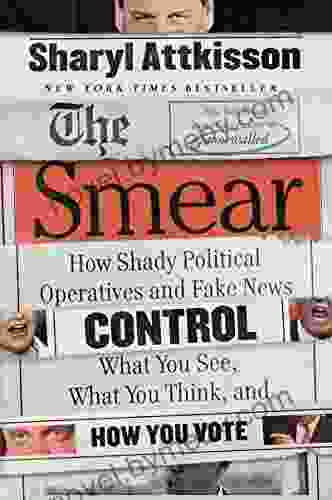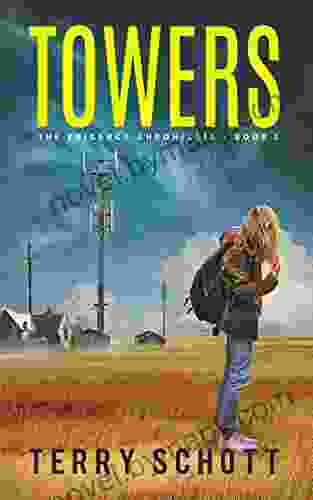How Shady Political Operatives and Fake News Control What You See and Think

In the era of fake news and political polarization, it's more important than ever to be aware of the ways in which our perceptions are being manipulated. This book will show you how shady political operatives and fake news sources are using social media, search engines, and other platforms to control what you see and think.
4.8 out of 5
| Language | : | English |
| File size | : | 3975 KB |
| Text-to-Speech | : | Enabled |
| Enhanced typesetting | : | Enabled |
| X-Ray | : | Enabled |
| Word Wise | : | Enabled |
| Print length | : | 307 pages |
| Screen Reader | : | Supported |
You'll learn about the different types of fake news, how it's created and disseminated, and the impact it's having on our society. You'll also learn about the role that social media and search engines play in spreading fake news, and how you can protect yourself from being manipulated.
This book is a must-read for anyone who wants to understand the current media landscape and how it's being used to manipulate our perceptions. It's a wake-up call for anyone who cares about the future of democracy.
Table of Contents
- Chapter 1: The Rise of Fake News
- Chapter 2: How Fake News Is Created and Disseminated
- Chapter 3: The Impact of Fake News
- Chapter 4: The Role of Social Media and Search Engines
- Chapter 5: How to Protect Yourself from Being Manipulated
Chapter 1: The Rise of Fake News
Fake news is not a new phenomenon. It has been around for centuries, but it has become much more prevalent in recent years, thanks to the rise of the internet and social media.
There are a number of factors that have contributed to the rise of fake news, including:
- The decline of traditional media outlets
- The rise of social media
- The increasing polarization of the political landscape
- The spread of misinformation and disinformation
The decline of traditional media outlets has made it easier for fake news to spread. In the past, people relied on newspapers, television, and radio for their news. These outlets were typically staffed by professional journalists who were trained to fact-check their stories. However, the decline of traditional media outlets has led to a loss of trust in the media. This has made it easier for fake news to spread, as people are more likely to believe stories that confirm their existing beliefs.
The rise of social media has also contributed to the spread of fake news. Social media platforms make it easy for people to share stories with their friends and followers. However, social media platforms are not always good at fact-checking the stories that are shared on them. This has made it easier for fake news to spread, as it can be quickly shared with a large number of people.
The increasing polarization of the political landscape has also contributed to the rise of fake news. In recent years, the political landscape has become increasingly polarized. This has led to a decrease in civility and an increase in name-calling and personal attacks. This has made it easier for fake news to spread, as people are more likely to believe stories that attack their political opponents.
The spread of misinformation and disinformation has also contributed to the rise of fake news. Misinformation is false or inaccurate information that is unintentionally spread. Disinformation is false or inaccurate information that is intentionally spread to deceive people. The spread of misinformation and disinformation has made it more difficult for people to find accurate information about important issues.
Chapter 2: How Fake News Is Created and Disseminated
Fake news is created in a variety of ways. Some fake news stories are created by individuals who are intentionally trying to deceive people. Other fake news stories are created by organizations or groups that are trying to promote a particular agenda. Still other fake news stories are created by bots or other automated systems.
Once fake news stories are created, they are disseminated in a variety of ways. Some fake news stories are spread through social media. Other fake news stories are spread through email or text messages. Still other fake news stories are spread through traditional media outlets, such as newspapers, television, and radio.
Fake news stories are often designed to appeal to people's emotions. They may be sensationalized or exaggerated, and they may contain emotionally charged language. Fake news stories may also be designed to confirm people's existing beliefs. This can make it difficult for people to recognize fake news stories, as they may be more likely to believe stories that confirm their own biases.
Chapter 3: The Impact of Fake News
Fake news can have a significant impact on individuals and society as a whole. Fake news can:
- Misinform people about important issues - Damage people's trust in institutions - Polarize people's views - Lead to violence or other harmful actions
Fake news can misinform people about important issues. This can have a number of negative consequences. For example, fake news can lead people to make poor decisions about their health, their finances, or their vote. Fake news can also damage people's trust in institutions. When people are repeatedly exposed to fake news, they may begin to lose trust in the media, the government, and other institutions. This can lead to a decline in civic engagement and a decrease in the quality of democracy.
Fake news can also polarize people's views. This is because fake news often confirms people's existing beliefs. When people are repeatedly exposed to fake news that confirms their own beliefs, they may become more entrenched in those beliefs. This can make it difficult to have productive conversations about important issues, as people may be less willing to listen to opposing viewpoints.
In some cases, fake news can lead to violence or other harmful actions. This is because fake news can煽动 people's emotions. When people are repeatedly exposed to fake news that is designed to make them angry or fearful, they may be more likely to engage in violent or other harmful actions.
Chapter 4: The Role of Social Media and Search Engines
Social media and search engines play a significant role in the spread of fake news. Social media platforms make it easy for people to share stories with their friends and followers. However, social media platforms are not always good at fact-checking the stories that are shared on them. This has made it easier for fake news to spread, as it can be quickly shared with a large number of people.
Search engines also play a role in the spread of fake news. Search engines rank websites based on a number of factors, including the popularity of the website and the relevance of the website to the user's query. This can lead to fake news websites appearing high in search results, even if the websites are not credible. This can make it more difficult for people to find accurate information about important issues.
4.8 out of 5
| Language | : | English |
| File size | : | 3975 KB |
| Text-to-Speech | : | Enabled |
| Enhanced typesetting | : | Enabled |
| X-Ray | : | Enabled |
| Word Wise | : | Enabled |
| Print length | : | 307 pages |
| Screen Reader | : | Supported |
Do you want to contribute by writing guest posts on this blog?
Please contact us and send us a resume of previous articles that you have written.
 Book
Book Novel
Novel Page
Page Chapter
Chapter Text
Text Story
Story Genre
Genre Reader
Reader Library
Library Paperback
Paperback E-book
E-book Magazine
Magazine Newspaper
Newspaper Paragraph
Paragraph Sentence
Sentence Bookmark
Bookmark Shelf
Shelf Glossary
Glossary Bibliography
Bibliography Foreword
Foreword Preface
Preface Synopsis
Synopsis Annotation
Annotation Footnote
Footnote Manuscript
Manuscript Scroll
Scroll Codex
Codex Tome
Tome Bestseller
Bestseller Classics
Classics Library card
Library card Narrative
Narrative Biography
Biography Autobiography
Autobiography Memoir
Memoir Reference
Reference Encyclopedia
Encyclopedia Robert J Sawyer
Robert J Sawyer Mark Clark
Mark Clark Sally Augustin
Sally Augustin Nikqua
Nikqua Rosemarie Anderson
Rosemarie Anderson Richard Melton
Richard Melton Sheryl Haft
Sheryl Haft Theo Hodges
Theo Hodges Stephanie Burgis
Stephanie Burgis Richard Lemarchand
Richard Lemarchand Richard A Polin
Richard A Polin Timothy A Sisemore
Timothy A Sisemore Roy Williams
Roy Williams Robert Greenfield
Robert Greenfield Rachel Lloyd
Rachel Lloyd Sara Fretz Goering
Sara Fretz Goering Sam Manicom
Sam Manicom Walter Block
Walter Block Philip Dale Smith
Philip Dale Smith Roger Gunn
Roger Gunn
Light bulbAdvertise smarter! Our strategic ad space ensures maximum exposure. Reserve your spot today!

 Henry David ThoreauFor Zentangle Coloring And More: A Journey into the Depths of Creativity
Henry David ThoreauFor Zentangle Coloring And More: A Journey into the Depths of Creativity
 Jonathan Franzen365 Days of Easy Breezy Recipes to Help Prevent the Onset of Hypertension
Jonathan Franzen365 Days of Easy Breezy Recipes to Help Prevent the Onset of Hypertension Emmett MitchellFollow ·2.6k
Emmett MitchellFollow ·2.6k Junichiro TanizakiFollow ·17.1k
Junichiro TanizakiFollow ·17.1k Douglas FosterFollow ·13.4k
Douglas FosterFollow ·13.4k Jan MitchellFollow ·17.2k
Jan MitchellFollow ·17.2k Finn CoxFollow ·4.2k
Finn CoxFollow ·4.2k Michael ChabonFollow ·5.3k
Michael ChabonFollow ·5.3k Elias MitchellFollow ·17.2k
Elias MitchellFollow ·17.2k Alex FosterFollow ·18.1k
Alex FosterFollow ·18.1k

 Mike Hayes
Mike HayesArthur Meighen: A Life in Politics
Arthur Meighen was one of Canada's most...

 Bryan Gray
Bryan GrayVindicated: Atlanta's Finest
In the heart of Atlanta, a...

 Houston Powell
Houston PowellHis to Defend: A Captivating Legal Thriller That Will...
An Unforgettable...

 John Green
John GreenUncover the Riveting Tale of "Hunted: Atlanta Finest" - A...
Prepare yourself for a...
4.8 out of 5
| Language | : | English |
| File size | : | 3975 KB |
| Text-to-Speech | : | Enabled |
| Enhanced typesetting | : | Enabled |
| X-Ray | : | Enabled |
| Word Wise | : | Enabled |
| Print length | : | 307 pages |
| Screen Reader | : | Supported |












